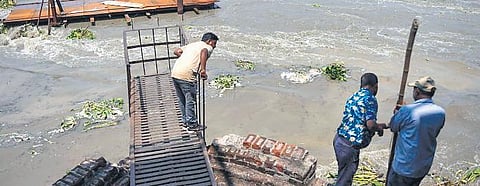

NEW DELHI: The Delhi government has said that the Yamuna is not fit for bathing in the absence of a minimum environment flow in the river, as per a report submitted to the Union Jal Shakti Ministry. “Minimum environmental flow for the dilution of polluted water in Yamuna is required to meet the desired water quality levels for bathing purpose i.e. BOD<3 mg/l and DO>5 mg/l,” the report read.
A study conducted by National Institute of Hydrology, Roorkee, recommended that 23 cubic metres per second (cumec) water should be released in the river from the Hathnikund Barrage in Haryana’s Yamuna Nagar district in the lean season for sustaining downstream ecosystems.
“The National Mission for Clean Ganga observed that the water sharing agreement of 1994 among the riparian states of Uttarakhand, Himachal Pradesh, Uttar Pradesh, Haryana, Rajasthan and Delhi is due for revision in 2025, implying that no revision will be possible to achieve the E-flow in Yamuna,”the report stated. “In the absence of a minimum environmental flow of the Yamuna in Delhi, it is very difficult to achieve bathing quality standards,” it mentioned.
The 22 km stretch of Yamuna from Wazirabad to Okhla in Delhi, which is less than two per cent of the river length, accounts for about 80 per cent of the pollution in the river. Untreated wastewater, poor quality of effluent discharged from Common Effluent Treatment Plants and sewage treatment plants are the major reasons behind pollution in the river, according to experts.
The Delhi government banned the sale, transportation and marketing of detergents which do not meet BIS standards to curb the pollution. The report also stated that out of the 35 sewage treatment plants in Delhi, 22 do not meet the wastewater standards prescribed by the Delhi Pollution Control Committee (DPCC).